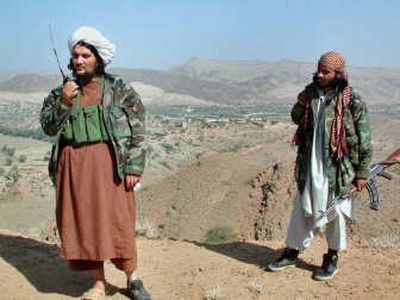Top Taliban leader kills self in face of raid

ISLAMABAD, Pakistan – A top Taliban commander who became one of Pakistan’s most wanted men after his release from U.S. detention at Guantanamo Bay, Cuba, died Tuesday as security forces raided his hideout, officials here said.
Abdullah Mehsud had earned a fearsome reputation by orchestrating repeated attacks and kidnappings. Intelligence agencies regarded him as a key figure in an insurgency that has recently been gathering intensity on both sides of the Afghan-Pakistani border.
Pakistani officials said Mehsud blew himself up with a grenade early Tuesday rather than surrender as security forces closed in on his hideout in Zhob, a town in Baluchistan province about 30 miles from the Afghan border. The town is also near Waziristan, a tribal area where the Pakistani military has been clashing with extremist fighters.
“This is a big blow to the Pakistani Taliban,” said Brig. Javed Iqbal Cheema, an Interior Ministry spokesman. “He was one of the most important commanders that the Taliban had in Waziristan.”
Other security sources, however, said that Mehsud’s effectiveness had been limited in recent years because he was being closely pursued by authorities, and that he was mistrusted by rival commanders.
“He was in close contact with Taliban commanders in southern Afghanistan, but strangely he had severed contacts with the leaders of his own tribe in Waziristan,” said one Pakistani intelligence official.
Mehsud’s death comes amid rising violence, and growing pressure from the United States on Pakistan’s president, Gen. Pervez Musharraf, to produce evidence that he is cracking down in an area where al-Qaida is believed to be active.
A controversial cease-fire with tribal militants in North Waziristan collapsed last week, and since then, they have carried out deadly strikes that have killed about 180. In recent days, the army has been fighting back, and a military buildup in the region continued Tuesday.
Residents of North Waziristan reported heavy shelling in the area late Tuesday as last-ditch efforts to revive the deal apparently failed. Mehsud, who was believed to be about 31, fought alongside the Taliban in the 1990s as it battled the group known as the Northern Alliance for supremacy in Afghanistan.
After the U.S. invasion of Afghanistan in late 2001, Mehsud was captured. He then spent 25 months in the U.S. detention center at Guantanamo Bay, but was released in March 2004, having apparently succeeded in concealing his identity from his captors. Mehsud later bragged he had convinced them he was Afghan, not Pakistani.
Almost as soon as he was released, the one-legged fighter – he lost a leg to a land mine – resumed waging war. In Afghanistan, he helped coordinate operations against U.S.-led forces, and in Pakistan he took on the national army.